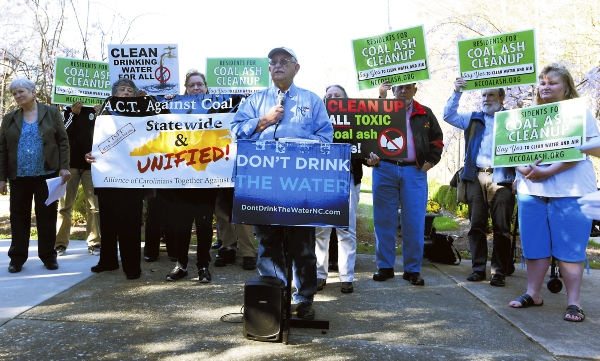Bergeron: Could water lines come to Dukeville?
Published 12:10 am Sunday, May 22, 2016

- Dukeville resident Robert Gobble speaks before a state hearing earlier this year at Catawba College on the priority ranking of coal ash basins at Duke Energy’s Buck Steam Station. Wayne Hinshaw/For the Salisbury Post
Amid last week’s news that Buck Steam Station’s coal ash ponds could be excavated by 2024, Duke Energy again raised the possibility that municipal water lines could come to the rural community of Dukeville.
In statements issued to members of the press and community leaders, Duke said ponds classified as intermediate could be downgraded to low-risk. The company, however, included municipal water in an equation that leads to the priority ranking downgrade. Citing the Department of Environmental Quality, Duke Energy said “all basins except those already designated as ‘high’ could be ranked ‘low’ once this work is done and other steps are taken, including ensuring plant neighbors have the assurance of a high-quality water supply.”
Just to clarify, Duke Energy said that a downgrade in ranking would include providing a water supply, not that it could include a permanent water supply. In its announcement this week, the Department of Environmental Quality said something similar: “recent discussions indicate that providing nearby residents permanent alternative water will relieve any future concerns.”
Even with a water line extension, a low-risk priority ranking may be less expensive than excavation, which most Dukeville residents favor. A low-risk ranking allows Duke to cap coal ash ponds in place, a solution it says is just as safe as excavation.
It’s not the first time Duke Energy has mentioned the possibility of building a water line, but it’s certainly a notable one.
After the first water wells in Dukeville were declared unsafe in 2015, a Duke energy spokesperson said the company would commit to extending a water line if a groundwater assessment shows plant operation resulted in unsafe drinking water. The assessment, conducted by Duke Energy, didn’t show coal ash ponds were responsible for nearby wells that were declared unsafe. However, Duke Energy CEO Lynn Good CEO this week told reporters that a municipal water line may provide “peace of mind” to neighbors of coal ash ponds.
So, will Salisbury-Rowan Utilities or a county-owned system offer hookups to Dukeville residents because of coal ash ponds? There’s a significant possibility.
Rowan County commissioners already have plans to extend a water and sewer line into the Dukeville community for economic development purposes. If it was only extended to lure a manufacturing plant into Rowan County, the line would stop just short of many houses located nearby, according to Rowan County’s water and sewer study completed last year.
Luckily, the study also includes cost estimates for the entire project, which Rowan County couldn’t possibly pay for using tax revenue alone. Instead, the county aims to secure multi-million grants to help push a county-owned water and sewer system into construction.
If Rowan wanted enough money to build all the planned lines in its “north study area” — Dukeville — it would cost $9.84 million for water and $9.73 million for sewer, according to the county’s recently completed study. Actual costs could vary once Rowan selects companies to build the project, but the study provides a reasonable and recent benchmark.
Duke Energy could provide a portion of the money needed to build water lines. And, there’s a precident for that practice. Earlier this year, the Cape Fear Public Utility Authority finished extending water lines to a community near Duke’s Sutton Plant. The Wilmington Star-News reported in February that Duke contributed $3.18 million to the project.
Rowan County would likely own the water lines, but the actual water would come through Yadkin River intakes operated by Salisbury-Rowan Utilities.
To be clear, the water in the Salisbury-Rowan Utilities system is safer than well water in Dukeville. SRU contains some of the same elements seen in Dukeville water wells. On average, however, the levels in SRU are lower than wells in Dukeville.
A hookup to a water system, however, creates a whole other set of concerns. Dukeville residents would likely pay more for water than they would with a water well. The water system, however, may provide the safety and certainty that the rural community has been searching for.
At least Duke Energy and environmental regulators are thinking about the idea.
Reporter Josh Bergeron covers politics, county government and the environment for the Salisbury Post.

